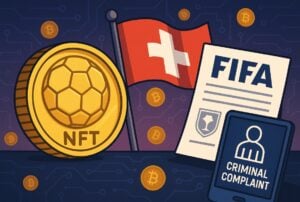On 17 October 2025, GESPA filed a criminal complaint alleging unlicensed gambling tied to FIFA Collect’s World Cup drops and fifa nft prize mechanics.
What did the Swiss gambling regulator complaint allege about the FIFA World Cup NFT and the FIFA Collect platform?
Note: The complaint centres on whether chance-based prize mechanics in token drops amount to regulated gambling or lotteries in Switzerland.
GESPA’s filing on 17 October 2025 alleges that participation in certain FIFA Collect competitions required a monetary stake and that outcomes depended on random draws or chance-based procedures.
The regulator says those mechanics can qualify as lotteries or sports betting under Swiss law and therefore require licences.
Prosecutors must now verify transactional records and participant targeting to determine jurisdiction and criminal liability. GESPA press release (17 October 2025)
In brief: GESPA alleges FIFA Collect’s prize mechanics may amount to unlicensed gambling; Swiss prosecutors will review the evidence and decide on charges.
How do nft gambling laws switzerland affect FIFA’s NFT-based prize competitions?
Tip: Swiss gambling statutes can capture chance-based rewards even when issued as digital collectibles.
Under current interpretation, offerings that embed chance-based rewards—token drops, raffles or challenges—can fall within gambling or lottery statutes. Regulators assess whether the product requires a licence based on the stake, prize structure and the role of chance.
Quick definitions
- GESPA: Swiss Gambling Enforcement and Supervision Authority.
- NFT-based prize competitions: token sales or drops that include chance-based rewards.
- Unlicensed gambling: operations running games of chance without a Swiss licence.
Legal tests will focus on consumer targeting and the mechanics used to determine winners. For regulatory context, see our analysis on tokenised gaming and compliance in a previous report.
In brief: If token drops or raffles are chance-based and accessible to Swiss consumers, GESPA may treat them as gambling, requiring licensing and oversight.
What is the significance of FIFA’s migration from Algorand to Polygon (2023) and its broader FIFA Blockchain plans?
Note: The platform migration and FIFA’s announced blockchain plans provide technical and commercial context for product design and regulatory exposure.
FIFA Collect migrated from Algorand to Polygon in 2023 to improve scalability and reduce costs. FIFA has also discussed a proprietary “FIFA Blockchain” architecture for future digital products and ticketing.
An independent blockchain law expert says prosecutors will likely request KYC records, fee disclosures and on-chain transaction logs to assess intent and compliance. FIFA has said it will cooperate with Swiss authorities and provide requested documentation; FIFA statement (17 October 2025).
For background on platform migration and compliance risks, read our coverage of Polygon upgrades here.
In brief: The complaint could slow or reshape FIFA’s blockchain rollout by forcing clearer disclosure, licence checks and enhanced AML/KYC procedures tied to NFT prize mechanics.
